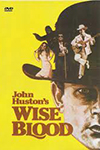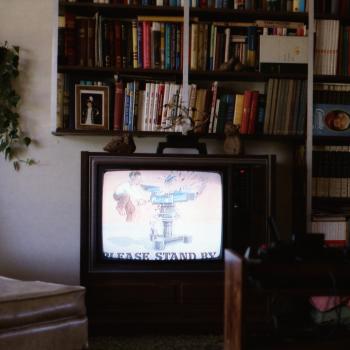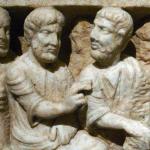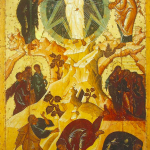 TCM broadcast John Huston’s film version of Wise Blood yesterday, and I wound up watching it again. The whole movie is available on YouTube, so there was no need for me to delay my plans for two hours. I did it anyway.
TCM broadcast John Huston’s film version of Wise Blood yesterday, and I wound up watching it again. The whole movie is available on YouTube, so there was no need for me to delay my plans for two hours. I did it anyway.
I wanted to see some perfect casting—Brad Dourif, Mary Nell Santacroce, and Ned Beatty, to name just a few—and Huston’s low-budget cinematography. The story, set in post-World War II, is shot in 1970s Georgia, and the blend of the earlier and later dates gives a timelessness to the production, one I think Flannery O’Connor, author of the novel upon which the film is based, would appreciate.
Now, there are parts of the film that aren’t congruent with the novel—for example, a misinterpretation of the comic at times, and a hillbilly score that rankles the nerves. Furthermore, Huston had to have the point of the book explained to him by the Fitzgerald family, O’Connor’s friends, who were advisors on the script.
Being an atheist, he thought Hazel came to an existential discovery in the end, one that shed him of both his faith as well as his attempted anti-faith. But in an enlightening interview (also on YouTube), Dourif says that he and the Fitzgeralds challenged that interpretation. In the end, the great director had to concede: “Jesus wins.”
What jumps out most in the film is the dialogue, which is faithful to the novel. For that reason, it’s full of the metaphysical conceits in prose—if you can have prosaic conceits (which is itself a pretty nice irony, come to think of it) for which O’Connor is famous.
Hazel Motes, unable to escape Jesus with a plan to form the “Church without Christ,” has taken the fastest way back to him by scouring out his eye sockets with quick lime. For the sensible, reasonable, respectable of the world, such a measure is a shock of monstrous proportions. And when his landlady discovers that he’s also been mortifying his flesh with wire around his chest and rocks in his shoes, she tells him that he’s acting “unnaturally.”
“It’s natural,” answers Hazel.
“Well, it’s not normal,” retorts the landlady. “It’s like one of them gory stories—it’s something people have quit doing—like boiling in oil or being a saint or walling up cats. There’s no reason for it. People have quit doing it.”
Hazel simply replies, “They ain’t quit doing it as long as I’m doing it.”
She carries on with her reasons, accusing him of being “an agent for the Pope.” But Hazel puts an end to it all; he hasn’t got time to argue with her.
For time is his problem.
He sits on the porch, splayed in a rocker, black patches covering the hollows through which he can now see the truth (“eyes can hold more”—he says in the book—“when they don’t have any bottoms in them”). His landlady rocks next to him; she’s sketched out certain designs in her mind and begins to put them in play (his government pension would be a comfort for a woman who’s led a hard life, deprived of both pleasure and pain).
As far as she’s concerned, all Hazel does is sit around, without object, without interest, staring into the space in his eyes, contemplating something just beyond them, or walking about the street like a “monk in a monkery,” circling in search of that which has neither start nor finish.
“Why don’t you become a preacher again?” she asks. “You could get you one of those seeing dogs, and he and you could get up a good crowd. People’ll always go to see a dog.”
But Hazel, emotionless, says he cannot preach anymore.
“Why?” she asks.
“I don’t have time.”
And in that line is all that needs saying; in that line is what must constantly be remembered. Hazel has wasted so much time running away, only to find himself running backwards, towards that which has pursued him with the relentlessness of dark love—dark because it is unfathomable, ineluctable, inexplicable.
There is no time. No pause to wait and wonder, to postpone and pretend.
This very night, all might be taken. This very night; and if that is so, why not this very hour, second, breath?
For him, the outrage of unmotivated love must be answered with the outrage of requital. Flood for flood, holocaust for holocaust; heart for heart. Now, not eventually.
Hazel Motes, with immolated eyes, fettered chest, pulped feet, cannot truck with mediated things; even the neutral, the ordinary, the static float of everyday life must be eschewed, let alone the comfortable and pleasant—none of these things can get in the way of one who has so much ground to reclaim.
And that can make a man think.
If it’s true, if Jesus has indeed won, if he is what he said he was and not some “trick,” as Hazel wants to make himself believe, not some doltish “god of a thousand faces” or some psychological recompense for having lost the protections of the womb, then what are we doing?
Is a life so long that it can be wasted in muddling? Is the world so safe, individual peace so assured, that we can flit about with half-measures, finding our way through circuitous journeys, study sessions, prayer logs, and the Bunsen and beaker of spiritual experiment? Have we time for the Augustinian plea?—“God make me Holy, but not yet.”
For it seems it is night now. It is night as much for the newly born as it is for the newly dead. It has been that way for some time, in fact, whether we’ve noticed it or not. It is night, and there is no longer time to buy the oil, to hunt the lamp, to scramble for matches. There is no time to lie anymore.
It is night, and we must close our eyes in order to see what comes. The eschaton wades in from the shallows; the bridegroom is here.
A.G. Harmon teaches Shakespeare, Law and Literature, Jurisprudence, and Writing at The Catholic University of America in Washington, D.C. His novel, A House All Stilled,won the 2001 Peter Taylor Prize for the Novel.
The photo above is the official cover of the movie adaption Wise Blood (directed by John Huston), reviewed here.















